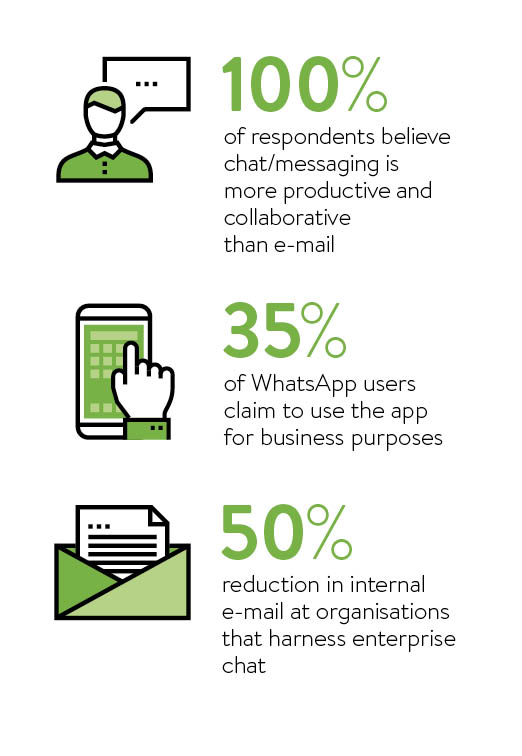Chat platforms have soared in popularity. The ability to share information instantly and intuitively strikes right at the heart of business need.
Messaging is direct, immediate, and relieves users from straining inboxes and long e-mail chains. It enables new joiners to get up to speed quicker, forming internal connections and allows knowledge to be retained, for example if someone leaves a team or the company. Real-time chat ultimately drives faster, better decision-making, harnessing input from multiple sources quickly.
 From a management point of view, messaging platforms also enable substantial cost-cutting and rationalisation, which is high on the agenda of many firms. They reduce the need for travel to meetings for instance, the need for complex IT infrastructure. They also reduce traditional telco cost and facilitate remote working, which in turn cuts office costs and boosts staff morale.
From a management point of view, messaging platforms also enable substantial cost-cutting and rationalisation, which is high on the agenda of many firms. They reduce the need for travel to meetings for instance, the need for complex IT infrastructure. They also reduce traditional telco cost and facilitate remote working, which in turn cuts office costs and boosts staff morale.
But for businesses, the rise of real-time messaging isn’t all plain sailing. It also signals challenges, especially in sight of users deviating from the secure parameters of corporate-defined IT platforms.
Unregulated messaging is already happening everywhere, between colleagues, with partners and often with customers. It is getting harder for organisations to legislate against it. Using popular chat and messaging platforms is after all very natural behaviour, an extension of life in the real world.
[embed_related]
Yet consumer or social messaging tools – WhatsApp, Viber, WeChat, Facebook – are unlikely to meet the organisation’s security and compliance requirements. Corporate data is highly sensitive after all; the DNA of what makes a firm successful. Could it fall into the wrong hands, leaving the business open to penalties or reputational damage? The recent list of data leaks is long. And what about record-keeping and time-stamping? What standing might messages have in a court of law or with an auditor?
So what’s the alternative? In this digital age, it isn’t realistic to ban the use of familiar tools through strict employee policy. Of the one billion-plus WhatsApp users, 35 per cent claim to use the app for business purposes. Take these tools away and staff may feel demotivated, knowing that more progressive companies are proactively equipping their staff with the latest technological aids.
Global organisations have recognised the need to place chat and messaging systems at the centre of their collaboration strategy
The greater the need for security, privacy and policy compliance in an organisation, the more imperative it is to find a solution which preserves employees’ ability to be fully connected and productive, but in a protected, controlled environment where communication stays private, sensitive data is safe, and transactions and timings can be reliably traced.
The financial services industry, one of the most highly regulated sectors, has made good progress here, implementing enterprise-calibre chat and messaging. More than many other markets, it has had to strike a balance between the need for high-velocity information exchange, empowering its workers – traders, decision-makers, front-office staff – while adhering to strict regulatory requirements.
As an example, financial organisations use support chat channels to offer dealers assistance with trading, risk arbitration channels to gain clarification on pricing and back-office channels to carry out end-of-day reporting, collaboratively and in real time.
Global organisations have recognised the need to place chat and messaging systems at the centre of their collaboration strategy, a concept that is now widely being referred to as Chat Enabled Collaboration (CEC). They are choosing platforms that integrate well with existing systems, unified communications (UC) platforms and ways of working, providing the robust controls these businesses need, but without detriment to user productivity.
Importantly, the platforms are highly scalable too, able to support thousands or tens of thousands of users, in contrast with many team collaboration tools looking to work on a smaller level.
The benefits of corporate messaging, beyond allowing employees to work in the way they need to, are multiple. Organisations that harness enterprise chat typically see a 50 per cent reduction in internal e-mail, improved retention and dissemination of knowledge, greater transparency, and so on.
Ultimately, it’s about embracing natural user behaviour and making it work in a business context. It’s a key facet of digital transformation, so let’s stay on message.
For more information please visit www.mindlinksoft.com





